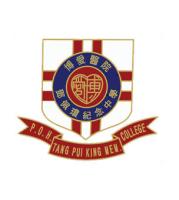| Language Policy |
Our school attaches great importance to bi-literacy and tri-lingualism. Diversified activities are held to enhance students' proficiency in English and Putonghua. Students are allowed to choose their language for answering the questions in public examinations. |
| Learning and Teaching Strategies |
We attach great importance to teaching effectiveness and diversified learning so both our formal and hidden curricula focus on cultivating students' independent thinking, self-discipline and ambition. Additionally, sharing and reading sessions have been set up in both English and Putonghua to further consolidate and enhance students' bi-literacy and tri-lingualism. Diversified subjects are offered to every class to meet the needs of students. Elective subjects of various key learning areas are offered for S.4-S.6. For life-wide learning, all S.1-S.3 students have to visit at least five private and public institutions within three years. |
| School-based curriculum |
1. Electives: 2X and 3X. School-based teaching and learning materials are tailor-made for different students of different abilities in some subjects.<br> 2. Curriculum highlights: Our curriculum is to cater for learner diversity and to develop students' generic skills through multi-intelligence strategies, cooperative learning and the use of IT. |
| Approach to Catering for Learner Diversity |
A variety of events are offered to all S.1 and S.3 students to foster a healthy lifestyle by the Counseling Committee. "English Enhancement Courses" are designed for all S.1 to S.3 students to consolidate their English foundation. Extra Maths lessons are held on weekdays and Saturday for selected students. Also, there are Chinese, English and Maths enhancement classes at senior forms to strengthen the foundation of the weaker students. |
| Approach to Integrated Education |
Our school adopts a Whole School Approach to implement Integrated Education. A Student Support Team has been established. Upon needs, the head of the Guidance Team and the Special Educational Needs Coordinator (SENCO) will regularly invite Educational Psychologist, parents, class teachers and subject teachers to formulate measures and offer support to help students with special educational needs (SENs) to fit in at school and learn joyfully and effectively. We also enroll teachers in courses on Integrated Education for them to deepen their understanding on the topic and master effective teaching methodologies, thus enhancing our teaching staff’s professionalism.<br><br>To have an early identification of SENs, we collect information of new students with special educational needs under the consent of their parents, and transfer suspected SEN cases to Educational Psychologist for assessments. We cater for different needs of our students with a “3-Tier Support Model”, utilising the Learning Support Grant and other school resources for diversified support. This may include afterschool homework guidance, social skill training groups, speech therapy services, and “Individual Education Plan”, etc. Parents of these students are provided with “Summary of Support for Student” annually so that they can understand the school’s support measures. In addition, there are flexible assessment arrangements of school’s internal examinations following HKEAA’s regulations, including time addition, special venues, etc. We also help our DSE candidates with special educational needs apply for special examination arrangements to ensure that they can be assessed fairly under a suitable environment. |
| Education Support for Non-Chinese Speaking (NCS) Students |
|
| Home-School Co-operation |
Our PTA aims to foster parent-teacher relationships and promote students' conduct and learning by regularly organizing activities related to home-school cooperation and sharing techniques in nurturing students. Our PTA is strong and provides essential support to the school. |
| School Ethos |
The community is pleased with our simple school ethos and good discipline. Students are provided with comprehensive support in the areas of academic affairs, discipline, guidance, student activities, extra-curricular activities, civic education, career guidance and gifted education. |
| School Development Plan |
The "3-year Development Plan" can be accessed on our school webpage. |
| Teacher Professional Training and Development |
Our teachers are encouraged to keep pursuing their professional development through attending various seminars and talks. They are also encouraged to observe classes of fellow teachers to enhance their teaching effectiveness. They are involved in at least two lesson observations every year. |
| Life-wide Learning |
In view of Life-wide Learning and Other Learning Experiences, students have access to various clubs and groups including the Students' Union, uniformed groups, service groups, sports, arts, academic and interest groups. All students are expected to attain a required standard in the areas of leadership training and services, music, and sports. Our students have been doing well in various inter-school, territory-wide, national and international competitions. They have been awarded prizes in creative arts, fencing, marching band, Latin dance, Chinese dance, Jazz dance, Mathematical Olympiad and drama competitions. Cross-curricular activities include project learning, visits to private and public institutions, participation in science project contests and field trips.<br>Moreover, "Life-wide Learning Days" are scheduled in November every year. This three-day event provides students with systematic extra-curricular activities inside and outside campus. |
